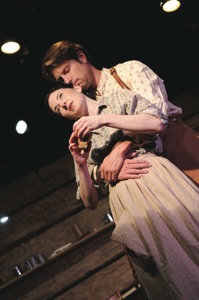-
- HIV scare puts Mo. school in uncertain territory
- Poll: Same-sex marriage ban trailing in Calif.
- E-mail targets gay state House hopeful in Mich.
- Ark. judge says he’s opposed to adoptions measure
- Fla. Amendment 2 opponents ask for investigation
- AIDS treatment should start sooner, study finds
- National News Briefs
- World News Briefs
Arts & Entertainment
Bloody politics
Published Thursday, 30-Oct-2008 in issue 1088
‘Bleeding Kansas’
We talk about “fighting” for votes and “battleground” states for a reason: the American electoral process has employed the vocabulary (and sometimes the tactics) of war for more than 150 years.
Race, ideology, gender and the search for personal freedom clashed in Kansas in 1855, after the Kansas-Nebraska Act specified that the territory would decide by public vote whether to be slave or free prior to attaining statehood. Partisans on both sides of the issue rushed to settle there, hoping to prevail in the vote.
Most settlers on both sides just wanted to farm in peace, but the pro-slavery “border ruffians” from neighboring Missouri were not averse to the use of intimidation, voting fraud and even violence; blood was spilled, and this era in the slave-versus-free state controversy became known to history as “Bleeding Kansas.” The Civil War would soon follow.
Bleeding Kansas is also the name of Kathryn Walat’s recent play, presented in its West Coast premiere by Moxie Theatre through Nov. 2 at Diversionary Theatre. Delicia Turner Sonnenberg directs.
Hannah Rose Allen (Jennifer Eve Thorn), a Bible-toting, “Uncle Tom’s Cabin”-reading abolitionist from New England, arrives in Kansas alone to try to influence the vote. Much of the play’s exposition is provided in letters written home to her sister Abby – letters at first wryly humorous, later somewhat discouraged and finally betraying some alarm. Her first opinion of Kansas: “Three parts danger, one part home.”
Hannah meets free-staters George (David S. Humphrey) and Kitty Clarke (Jo Anne Glover), looking for a place to homestead and bring up a family. Kitty, not shy about expressing her opinion, is clearly disappointed in Kansas and still grieving the loss of a young daughter en route. She just wants to start over, and wishes George at least had an inkling how to build a house so the wind didn’t whoosh through the spaces between the boards.
The Clarkes’ closest neighbor is Josiah Nichols (Mark Petrich), pro-slavery but like George just wanting to be left alone to farm his land.
Border ruffian Edwin Redpath, a.k.a. Red, is at first amused by Hannah, then impressed by her spunk, and later develops something like a crush on her.
These characters represent the forces at odds in the controversy, and though it could be said that the delicate line between play and history lesson is occasionally crossed, the characters are so well written and strongly portrayed that this is a minor cavil.
This is a great ensemble effort, but the show belongs to Glover and Thorn, who are the best I’ve ever seen them: two strong women searching for their place in a man’s world. When Kitty strikes a match on the sole of her shoe and lights a pipe, you know the world is about to change. The men are fine too, each playing more than one role.
Production values are high, including Jerry Sonnenberg’s set, Jennifer Brawn Gittings’ fine costumes, Jason Bieber’s effective lighting design and most especially Jason Connors’ sound design, using both traditional folk songs of the period and his own score for solo cello (hauntingly played by Erica Erenyi).
Moxie Theatre’s production of Bleeding Kansas plays through Sunday, Nov. 2, at Diversionary Theatre. Shows Thursday through Saturday are at 8 p.m.; Sunday matinees are at 2 p.m. For more information, visit www.gaylesbiantimes.com/links/1088.
‘Britannicus’
Controlling women and politics make for great drama. Remember Angela Lansbury in 1962’s The Manchurian Candidate, who got her son to kill her husband’s political rival?
Of course, there’s nothing new about the topic. Compass Theatre offers the 17th century French version – Jean Racine’s Britannicus – through Sunday, Nov. 23, at Compass Theatre. Miriam Cuperman directs this new translation by Howard Rubenstein.
Set in Rome during the reign of Nero, the main character is Nero’s mother (and Britannicus’ stepmother) Agrippina (Glynn Bedington, at her deliciously manipulative best), who years before managed to maneuver her way into marriage to her uncle, the emperor Claudius, and to get him to name her son Nero (Rich Carrillo) successor to the throne over Claudius’ own son Britannicus (Bayardo de Murguia).
Having accomplished this coup, did she gracefully fade into the background? Not on your life. Not content to be a mere kingmaker, she wants to rule from behind the throne ... and the maddening thing is that she does it in the name of filial love.
Nero tries denying access, but Agrippina responds with a mom’s usual arsenal: guilt trips, the martyr routine and veiled threats (in the French version, she even tries to have him castrated, but that’s been excised here).
The clash between Nero and Agrippina, conflicting advice he gets from Burrus (Neil McDonald) and Narcissus (Dale Morris), and Nero’s own desire to rule in his own right eventually lead to poor decisions and tragedy in which Britannicus is only one victim.
Compass has mounted a handsome production on its tiny stage, greatly enhanced by Abigail Hewes’ terrific costumes (and Roman sandals to die for). New director in town Cuperman has a sure hand on the action, adding welcome flourishes like music provided by Nero on the Roman lyra.
Racine wrote in the poetic alexandrine form, one nearly impossible to render in English. Rubenstein has made a serviceable straight-on free verse translation.
Ancient Rome was a man’s world, but Britannicus is a woman’s play, the best part written for Agrippina. I’ve never seen Bedington better than in this juicy part, and was delighted to see high school student Jenna Selby more than hold her own in the other speaking female part, Britannicus’ fiance Junia.
This is not to slight the men, who are all fine as well. My favorites are Carrillo’s mommy-whipped and indecisive Nero and McDonald’s Burrus, who overcomes a somewhat out-of-place British accent with his strong portrayal.
Ancient Rome, politics and a really strong woman. How could you resist the chance to see this seldom-performed play?
Britannicus plays through Sunday, Nov. 23, at Compass Theatre. Shows Thursday through Saturday are at 8 p.m.; Sunday at 2 p.m. For more information, visit www.gaylesbiantimes.com/links/1088.
|
|
Copyright © 2003-2025 Uptown Publications



